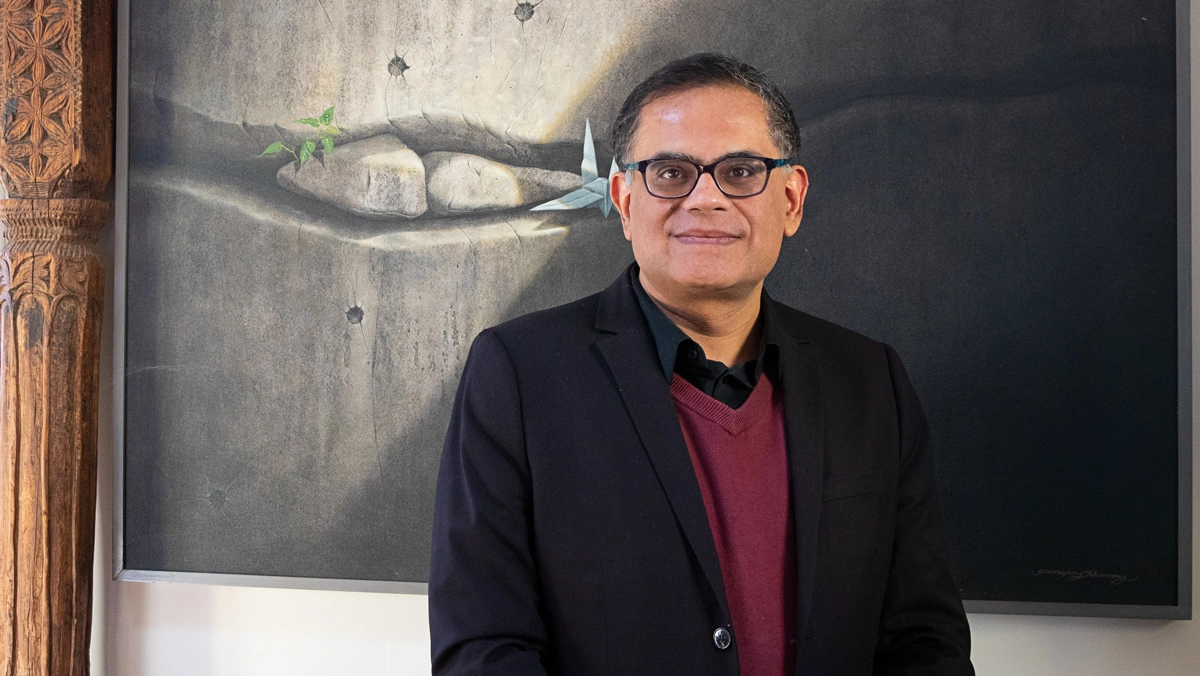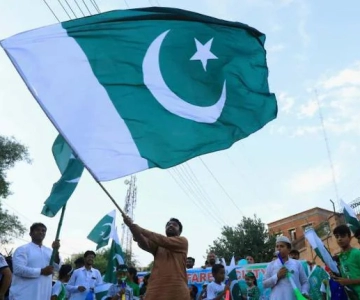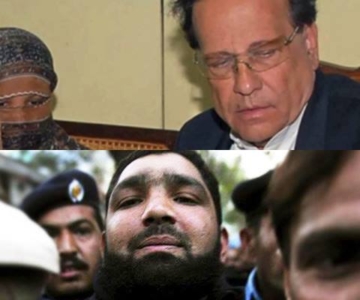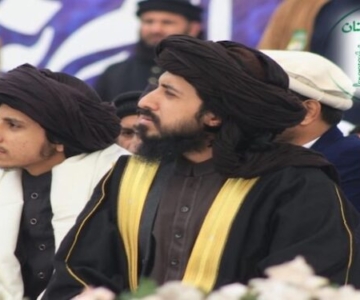I spoke with Clarion about fighting for freedom of speech when the price for failure is death.
Raza Ahmad Rumi is a Pakistani policy analyst, journalist and an author. He has been a leading voice in Pakistan’s public arena against extremism and human rights violations.
In March 2014, he survived an assassination attempt in which his driver lost his life. Within weeks, he left Pakistan and has been affiliated with the New America Foundation and the United States Institute of Peace.
He graciously agreed to speak with Clarion Project’s Research Fellow Elliot Friedland about Pakistan, free speech and blasphemy legislation.
Clarion Project: You are a writer. What challenges have you personally faced due to what you write about extremism in Pakistan?
Raza Rumi: When you write about growing radicalization and extremism and call for introspection, critique the role of clergy, then your writings are edited so as not to ruffle too many feathers. At times, one is labelled as anti-Muslim and anti-Islam for demanding a rational discourse on religion and its public manifestations.
Earlier, this opprobrium was restricted to verbal abuse and attacks, but now it has taken a dangerous turn with the increase of blasphemy law victims and in my case an assassination attempt.
Though I must clarify that writings in English draw less attention than those in the vernacular languages, I got into serious trouble due to my views aired on the mainstream Urdu broadcast media. My public engagement with media, academia/think tanks and civil society was too much for the extremists (backed by elements within the state) to handle. So they tried to silence me once for all.
Clarion: You have said that “Pakistan has turned into a society where even an allegation of blasphemy is enough to sentence and burn people.” Why is this becoming so rampant?
Rumi: This is a long story. The self-confessed religious identity of the state has led to growing space for clerics and Islamic radicals. In order to promote a religious brand of nationalism, the state has long encouraged an intolerant discourse, especially since the 1980s. Since then, the use of jihad a tool of state policy has led to the growth of private militias ready to implement their worldview through violence.
The state, due to its contradictions of identity, policy and worldview has been unable to enforce its writ. Thus the space for mob justice has grown. Now, someone accused of blasphemy need not wait for a trial. Instead, a frenzied mob, egged on by radical clerics can easily nab and kill you especially if you belong to the non-Muslim community or from a minority sect within Islam. Allegations of blasphemy are also being used to settle personal scores.
This is why at least four Christian settlements have been torched, several people accused of blasphemy have been lynched and even burnt alive. At the heart of this lies the abdication of state responsibility to ensure protection of life and property of its citizenry.
Emboldened clergy and an irresponsible media also complicate the issues of blasphemy. For instance, some TV presenters on their live shows watched by millions have advocated swift sentences for those accused of blasphemy while encouraging violence on the screen. One even allowed clerics to declare Ahmadis (a group banned as being non-Islamic by the Pakistani parliament) and Shias aswajib-ul-qatl (fit for murder). Media houses have taken no action nor has the regulator held anyone accountable.
Such a toxic alignment of sections of media with ultra-radical forces has added another layer to the problem of intolerance.
Clarion: What can be done to improve free speech in Pakistan?
Rumi: The foremost issue in this context is creating an environment where the state acts and fulfills its mandate to implement freedoms guaranteed under the constitution. Even if implemented, these freedoms are still curtailed. For example, Pakistan’s constitution and laws prohibit saying anything critical of Islam, the army, the judiciary and a vague concept called the Ideology of Pakistan. The latter was invented by Pakistan’s leaders since the 1960s and was made a sacrosanct idea in the 1980s.
Basically it includes anything related to Islam and Pakistan. Pakistan’s former Prime Minister Gilani (2008-2012) was fired by the Supreme Court for criticizing the decisions of the court under such legal provisions. Therefore, the constitution and laws have to be amended.
This is where the leadership and the parliament have to play an important role and redefine what they mean by criticism. Most of these laws were put into place under the Islamo-fascist regime of General Muhammad Zia-ul-Haq (1977-1988) and the laws have not been changed since then.
General Muhammad Zia-ul-Haq seized power in a military coup in 1977 and held it until his death in 1988. One of his central policies was ‘Islamization’ which among other things brought in “The Hudoud Ordinance” mandating strict punishments such as flogging.
Since those days, the power of religious lobbies has grown beyond belief. Now political parties cave into the pressure of violent religious groups and immediately retract whatever reform they articulate. The violent militias have enjoyed the patronage and support of the country’s powerful security establishment. So they have to rollback their past support to tame these groups.
Only when these laws are modified will there be more space for free speech. Until then this situation will continue. Ironically, the radicals now enjoy full rights of free speech, as they are free to preach hatred towards non-Muslims, minority sects and concepts such as liberty, democracy and human rights. While those who oppose them run the risk of facing threats and in certain cases, like me, a physical assassination attempt.
Clarion: Malala Yousafzai has just become the youngest person ever to receive the Nobel Peace Prize. Yet she cannot return to her home country. How can her personal triumph be used as a catalyst for wider change and to overcome such staunch opposition?
Rumi: The story of Malala Yousafzai is one of immense courage but it also elucidates what is wrong with Pakistani society and the state. When she was shot, a large section of the population thought that this was a fake story made up by the West to defame Pakistan.
Later, when evidence of the harm was incontrovertible, there were multiple conspiracy theories churned out. But for many girls and children she is also a role model. Her success can be used to spread education in the country.
More importantly, it is a moment for female empowerment. Her exemplary father is another model of a man giving full rights and encouragement to a daughter which sadly many Pakistani (and South Asian) fathers don’t. So recognition of her bravery may lead to change in the longer term. It will only really be effective if the xenophobia dominant in Pakistan is adequately challenged by the leadership.
Clarion: Malala is perceived as a Western stooge by some in Pakistan. Who are those people? How can this confrontational mentality be overcome in order to more effectively challenge Islamism and bring about change?
Rumi: Those fighting against the state and those who attacked Malala consider her an agent of the West. They blame her for promoting Western values in Pakistan, i.e. education for women. And Pakistan has seen the promotion of Taliban ideology as a state project since the 1990s. To justify Pakistani support of the Taliban in neighboring Afghanistan, there have been myths created to prove that they are right and just. This unfortunately includes justifying their brutal treatment of women.
So when Malala was attacked, the popular cricketer-turned-political leader Imran Khan was hesitant to blame the Pakistani Taliban and instead whipped up anti-Americanism.
Similarly, the religious parties also pitted against the US war on terror circulated her pictures of a meeting with former US Secretary of State Holbrooke. The idea was to paint her as an evil kid who somehow angered the militants and deserved this treatment. Then there is another group on the Left who thinks that Malala has been made into an icon by imperialist interests to serve their own ends. Locked into these narratives, her story became controversial in Pakistan.
This indicates a war of ideas. At the end of the day, Malala’s ordeal and her miraculous recovery is a powerful counter-narrative to a radicalized worldview. The political parties thus far have supported her struggle and message and they are central to social change and need to continue their support for education.
But the most tragic part is that Malala cannot return home, yet unless the jihad infrastructure is dismantled or weakened by the Pakistani army that created it in the first place during 1980s with US and Saudi support for regional geopolitics.
Clarion: Since the Charlie Hebdo attacks and the subsequent inclusion of Mohammed on the cover of last week’s Charlie Hebdo, Muslims in various countries have been burning the French flag and protesting against the magazine.
Al-Qaeda and other groups want to provoke a war between Muslims and the West, something we want to avoid.
How can this situation be diffused while remaining resolute on supporting the principle of free speech?
Rumi: The tensions heightened by the events that have taken place since the Paris attacks can be diffused by dialogue among different segments of the society. At the same time, leaders of the Muslim communities should work towards countering the radical currents within Muslim thought and reject those who use violence.
However, this is easier said than done especially when the Saudi kingdom and its affiliates are investing huge resources in the promotion of a minority view of Islam.
At the same time, the Western societies would need to reexamine their laws, the education system and other social structures that marginalize Muslim immigrants.
As I recently wrote, Islam needs reformation from within and that is a task of Muslim states and their leaders.
The defunct platform of OIC, the Organization of Islamic Countries, needs to lead and do something. Otherwise, the situation is turning into a self-fulfilling prophecy of the Islamic radicals: the more they display barbarity, the more the world thinks that there is something wrong with the religion. And over a billion Muslims are trapped in these hate-narratives and violent ideologies professed and practiced by an armed minority backed by a cabal of loud, noisy clerics.



